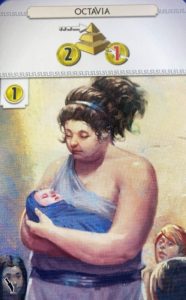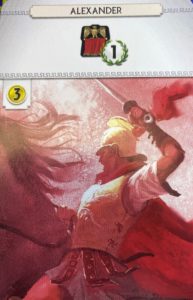Leader Cards used in the 7 Wonders Leaders Expansion
Standard Leaders
Alexander
King of Macedonia, conqueror, founder of the ancient Greek empire. The only monarch in History to have forged and empire uniting both Orient and Occident.
Game Use: At the end of the game, he adds 1 vp to each Victory token earned in military combat. If you won military combat in age I that combat is worth 2 vp instead of 1 vp. This card can be played before age III as you will know at that point if you have won enough military to make it worth putting into play.
Amytis
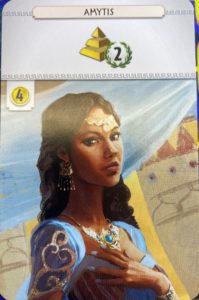
Wife of Nebuchadnezzar, for whom the Hanging Gardens of Babylon are said to be built.
Game Use: At the end of the game, she is worth 2 vp for each wonder stage built by the player. The easy answer with this is you would get less
Archimedes
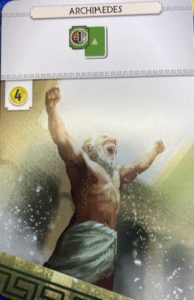
Greek mathematician, scientist, physicist and engineer, the number Pi is associated to him as well as the calculation of bodies’ volume mass by immersion in water.
Game Use: From the moment he enters play, he allows the player to build green structures for one resource less than their written cost. This helps with a scientific strategy, and you get the most benefit if you put this into play as your first leader.
Aristotle
Greek philosopher, long considered to be the ultimate embodiment of antique wisdom in the Occident due to his encyclopedic knowledge of arts and sciences.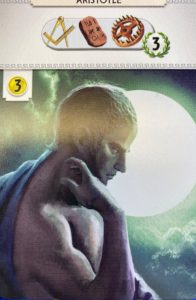
Game Use: At the end of the game, he adds 3 vp to each set of different scientific symbols (meaning that the bonus goes from 7 vp to 10 vp per set). This card also will aid a scientific strategy. Don’t be surprised if opponents don’t try to block you from getting complete sets.
Bilkis
Queen of the Kingdom of Saba Sublime, impressive by her wisdom and her intelligence, she’ mainly known though the tales of King Solomon, which tell of her prosperity.
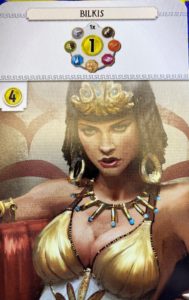 Game use: If you can get this card you take it, the ability to get any resource from the bank for 1 coin not only denies your neighbor the ability to make money off resources, it also allows you to draft less resources.
Game use: If you can get this card you take it, the ability to get any resource from the bank for 1 coin not only denies your neighbor the ability to make money off resources, it also allows you to draft less resources.
Caesar
Roman general, politician, and writer. Rome’s early days owe their thanks to him and his military acumen.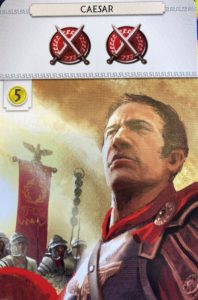
Game Use: If you want to get a military victory, then this is a must. This gets you two military.
Cleopatra
The most well known of the Egyptian monarchs, her charm and subterfuge allowed her country to shine despite the Roman conquest.
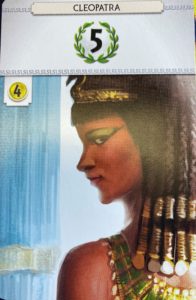 Game Use: Easy 5 victory points.
Game Use: Easy 5 victory points.
Croesus
Last king of Lydia, famous for his immense fortune, which notably served to finance the construction of one of the wonders of the ancient world, the Temple of Artemis.
Game Use: When he enters play, immediately grants 6 coins taken from the bank.
Euclid
Greek mathematician, geometry specialist, and the author of an important text on modern mathematics: The Elements.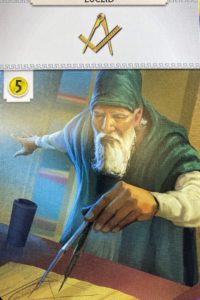
Game Use: provides a compass science symbol. Can be used in a combination just like any other science card.
Hammurabi
King of Babylon at an age where the oldest known code of law known to History was written.
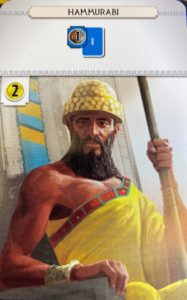 Game Use: From the moment Hammurabi enters, play all blue cards for one less resource than their written cost. To get the maximum benefit, you will want to get this card out early.
Game Use: From the moment Hammurabi enters, play all blue cards for one less resource than their written cost. To get the maximum benefit, you will want to get this card out early.
Hannibal
Carthaginian general. One of the greatest military tacticians of History, famous for having seriously threatened Rome after crossing the Pyrenees with his elephants.
Game Use: Provides one military, can be used to support a military strategy.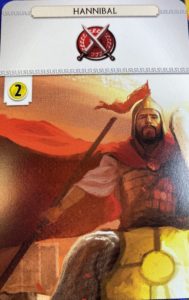
Hiram
A smelting and blacksmith artisan, he helped King Solomon considerably when building his temple
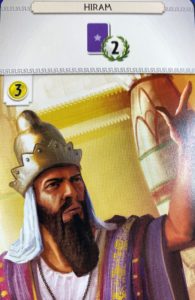 Game Use: This grants victory points for purple cards you have in play. Since purple cards are random and you have no idea what resources you will need to bring them in, it is wise to use this card if you have build your strategy around aquiring resources outside of your
Game Use: This grants victory points for purple cards you have in play. Since purple cards are random and you have no idea what resources you will need to bring them in, it is wise to use this card if you have build your strategy around aquiring resources outside of your
Hypatia
Philosopher and mathematician, daughter of the last director of the Museum of Alexandria. Known as much for her grace and beauty as for her intelligence and her eloquence.
Game Use: grants 1 victory point for every science (green) card in your city. A must for anyone trying to win with science.
Imhotep
Founder of Egyptian medicine, religious reformer and Egyptian builder. He is the architect of the most ancient angled pyramid in the world.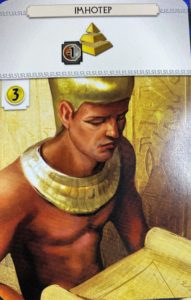
Game use: From the moment, Imhotep enters play, allows you to build each stage of your wonder for 1 less resource. Important to get this into play prior to building stages of wonders to get the most benefit, as it will allow you to collect or pay for less resources.
Justinian
Byzantine emperor. The most well known figure of late Antiquity, mainly for his restoration, albeit partially successful, of the Roman Empire.
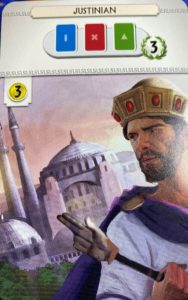 Game Use: At the end of the game, Justinian is worth 3 victory points for each set of 3 age cards (red, blue, green) present in the player’s city.
Game Use: At the end of the game, Justinian is worth 3 victory points for each set of 3 age cards (red, blue, green) present in the player’s city.
Leonidas
Agiad king of Sparta who met a heroic death with 300 of his soldiers during the battle of Thermopylae while resisting the Persian invasion.
Game Use: As soon as Leonidas enters play all military (cards) at a cost of 1 less resource. This is useful for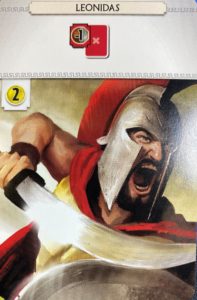 anyone trying to win military battles.
anyone trying to win military battles.
Maecenas
Roman politician who used his influence and his fortune to promote arts and literature.
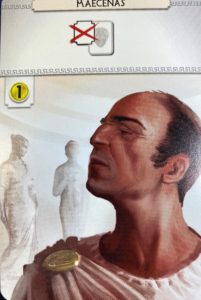 Game Use: As soon as Maecenas enters play, his controlling player can recruit all of his or her future Leaders for free (during the recruitment phase), without having to pay their coin cost. If you get this card, you will want to put it into play in the first round to get the max benefit.
Game Use: As soon as Maecenas enters play, his controlling player can recruit all of his or her future Leaders for free (during the recruitment phase), without having to pay their coin cost. If you get this card, you will want to put it into play in the first round to get the max benefit.
Midas
King of Phrygia. Known mainly for his wealth and myth stemming from it, which said that everything he touched turned to gold.
Game Use: At the end of the game, Midas is worth 1 vp per every 3 coins in the player’s treasury. This is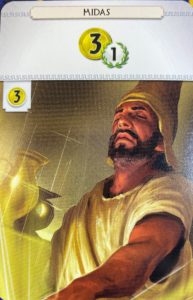 added to the vp you already get for coins. Since this leader only benefits you at the end of the game, you can keep this until the 3rd era and put into play if you have a lot of money put into play otherwise you can play the other card you have if it gives you more benefit.
added to the vp you already get for coins. Since this leader only benefits you at the end of the game, you can keep this until the 3rd era and put into play if you have a lot of money put into play otherwise you can play the other card you have if it gives you more benefit.
Nebuchadnezzar
King of Babylon. Known for the many works and many merits he had erected throughout his kingdom and the cultural aspect due to them.
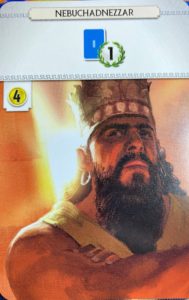 Game Use: Grants 1 victory point for each blue card you have in play at the end of the game. I find this card to be a great card but it does have a four coin cost.
Game Use: Grants 1 victory point for each blue card you have in play at the end of the game. I find this card to be a great card but it does have a four coin cost.
Nefertiti
Great royal wife of the Pharaoh Akhenaten, dearly beloved by her people, the artistic representations of her were more numerous than those of her husband.
Game Use: Worth 4 victory points.
Nero
Roman emperor. Known for his bellicose and easily riled personality, his rule brought military success to the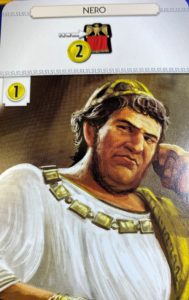 Empire, as well as a monetary reform revaluing the denarius.
Empire, as well as a monetary reform revaluing the denarius.
Game Use: Nero grants 2 coins for each Victory token earned by the player from this point forward. Good for players looking to combo military and coins for victory points. Combos well with Midas.
Pericles
Exceptional Athenian orator and politicianas well as brilliant strategist. He was very influential among his troops and feared by his foes during the Peloponnesian war.
Game Use: Grants 2 victory points per red card you have in play at the end of the game. Great with a military strategy, this card is expensive, can be put into play in the 3rd era giving you time to evaluate if this is the best 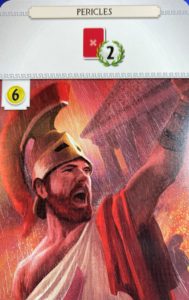 card to put into play.
card to put into play.
Phidias
Sculptor of the first Greek classic style, man architect of the Athenian Parthenon
Game Use: Grants 1 victory point for every brown resource card you have in play at the end of the game. If you have a wonder that is going to need a lot of resources, this card could be a benefit. This card can be played in the 3rd era at which point you will know exactly how much this card is going to benefit you or if the other card in your hand will give you more benefit.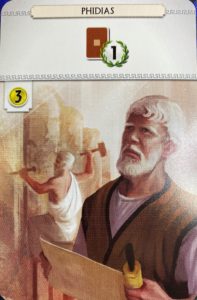
Plato
Greek philosopher, considered to be among the most important and omniscient. His work attest to the polyvalence of his knowledge: politics, justice, science, culture, arts.
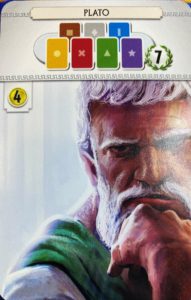 Game use: At the end of the game, Plato is worth 7 victory points for each set of 7 age cards (brown, gray, blue, yellow, green, red, and purple) present in the player’s city. Considering you get 6 cards to play per era, that is 18 cards. It is possible to get this twice but you would need to pick up two purple in the 3rd era. This would limit your ability to use other strategies. By the time you bought 2 or 3 stages of your wonder this is really tight to making sure you get a complete set. Also easy for others on the table to try and block.
Game use: At the end of the game, Plato is worth 7 victory points for each set of 7 age cards (brown, gray, blue, yellow, green, red, and purple) present in the player’s city. Considering you get 6 cards to play per era, that is 18 cards. It is possible to get this twice but you would need to pick up two purple in the 3rd era. This would limit your ability to use other strategies. By the time you bought 2 or 3 stages of your wonder this is really tight to making sure you get a complete set. Also easy for others on the table to try and block.
Praxiteles
Sculpture of the second Greek classic style. First artist to have represented female nude in Greek sculpture.
Game use: Grants 2 victory points to every gray card in your city. Play this card in the third era as you can play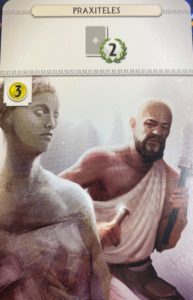 a different card if that would result in more points.
a different card if that would result in more points.
Ptolemy
Greek astronomer and astrologer, author of the Amalgest, an important text on astronomy which deeply influenced Occidental thought until the Renaissance.
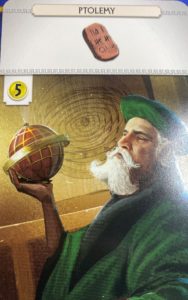 Game Use: Provides a tablet just like if a green science card with a tablet on it was played. This is handy to have in your hand if you are going for a science strategy. Though, it is hard to anticipate what science symbol you might need.
Game Use: Provides a tablet just like if a green science card with a tablet on it was played. This is handy to have in your hand if you are going for a science strategy. Though, it is hard to anticipate what science symbol you might need.
Pythagoras
First self-proclaimed philosopher and Greek mathematician specialized in the laws of numbers, leading to the development of arithmetic, music, and geometry.
Game use: Provides a gear just like a green science card with a gear on it was played. This is handy to have in your hand if you are going for a science strategy. Though like others like it, ancticipating what you will need to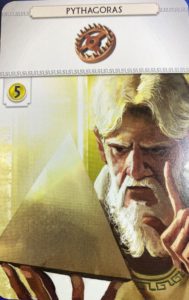 complete science sets.
complete science sets.
Ramses
Third Pharaoh of the Twenty-Ninth Dynasty. One of the monarchs who ruled the longest in Egypt and to whom is linked the greatest number of cultural remnants.
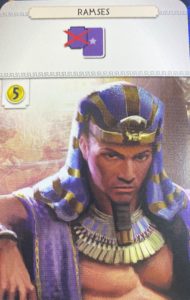 Game Use: As soon as Ramses enters play, the player can build all guilds (purple cards) for free, without having to pay their resource costs.
Game Use: As soon as Ramses enters play, the player can build all guilds (purple cards) for free, without having to pay their resource costs.
Sappho
Greek poet who lived in Lesbos. Known to have been fiercly feminist at an age when misogymy was the norm.
Game Use: Grants 2 victory points at the end of the game.
Solomon
King oof Israel whose wisdom and incorruptible sense of justice are legendary. He ordered Jerusalem’s first temple built and gave his kingdom a highly strucured adminstration.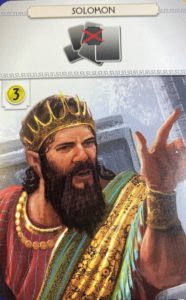
Game Use: Once Solomon enters play, the player can choose an Age card from the discard pile and put it in play for free. For the possibility of getting the best possible card you will want to play this in the third era.
Varro
Roman soldier, scientist and writer. His Rerum Rusticarum is a collection of texts describing one of the most complete pictures of agricultural management during the Antiquity.
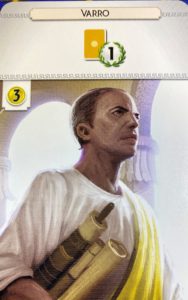 Game Use: Grants 1 victory point for every yellow card in your city.
Game Use: Grants 1 victory point for every yellow card in your city.
Vitruvius
Roman architect. HIs writings have strongly influenced the arts of the Renaisance and his treatise. De Architectura, remains a majore work of classic Antiquity.
Game Use: Once he enters play, Vitruvius grants 2 coins whenever the player builds a structure for free, through building chains. The coins are taken from the bank when the structures are built. This would be primary blue cards with a few of them being red military cards.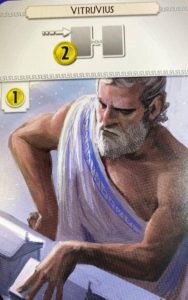
Xenophon
Greek philosopher, historian, soldier. Author of the first agronomy treatise known to Hisotry, the Economicus
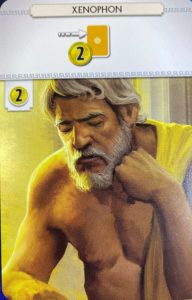 Game Use: Grants 2 coins for each yellow card (commercial structure) that the player builds from his point forward. The coins are taken from the bank, at the moment when the structures are built. If you have this card it is important to get it into play at the start of the first era.
Game Use: Grants 2 coins for each yellow card (commercial structure) that the player builds from his point forward. The coins are taken from the bank, at the moment when the structures are built. If you have this card it is important to get it into play at the start of the first era.
Zenobia
Queen of the Palmyrene Empire in the third century. She shaped her city into a prosperous cultural cetner, attracting many notable personalities of the time.
Game Use: Worth 3 victory points at the end of the game.
Expert Leaders
Aganice
Was a Greek astronomer and thaumaturge of the 2nd or 1st century BC.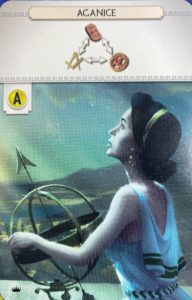
Game Use: This allows you to swap 1 science symbol at the end of the game. This can help a science strategy. It also makes it harder for an opponent to block your science strategy. This can be used a science card played or another leader that provides a science symbol. Also the A cost mean you pay a varing rate for this card depending on what age you bring Aganice into play. If you bring it in age 1 you pay 1 gold, age 2 you pay 2 gold, age 3 you pay 3 gold.
Agrippina
Was a Roman Empress. She was known for your background dealing due to her political ties from being the younger sister of Caligula, fourth wife of Claudius, and the mother of Emperor Nero.
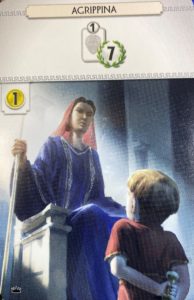 Game Use: The card allows you to get 7 victory points if it is the only face up leaders card. That means you won’t be able to play any other leader cards. You will either use the other leaders cards for money or to build your wonder. This is not a terrible card especially if your strategy relies on a few things to fall into place. Typically I will take this in the third or fourth draft round if nothing else is in those drafts looks to be fitting my strategy.
Game Use: The card allows you to get 7 victory points if it is the only face up leaders card. That means you won’t be able to play any other leader cards. You will either use the other leaders cards for money or to build your wonder. This is not a terrible card especially if your strategy relies on a few things to fall into place. Typically I will take this in the third or fourth draft round if nothing else is in those drafts looks to be fitting my strategy.
Berenice
Was Queen of Egypt by marriage to Ptolemy I Soter. She became the second queen, after Eurydice, of the Ptolemaic dynasty of Egypt.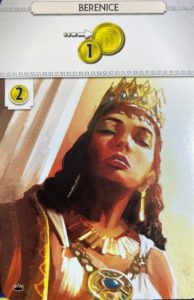
Game Use: Once this card enters, once per turn, when you gain Coins from the reserve, you take 1 extra coin. This card is in the expert and to get full benefit of this card can be tricky. There are other leaders that are easier to get a similiar effect.
Cornelia
Cornelia puts herself apart from the rest of the Roman female leaders because of her interest in literature, writing, and her investment in the political careers of her sons.
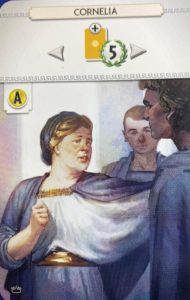 Game Use: At the end of the game you get 5 victory points only if you have more yellow cards than both of your neighbors counted seperately. This card also have a variable cost depending what age you are in. In age one this card cost 1 gold, 2 gold in age 2, and 3 gold in age 3. This card can be tough as you can leave a lot of other victory points on the table while collectiong yellow cards.
Game Use: At the end of the game you get 5 victory points only if you have more yellow cards than both of your neighbors counted seperately. This card also have a variable cost depending what age you are in. In age one this card cost 1 gold, 2 gold in age 2, and 3 gold in age 3. This card can be tough as you can leave a lot of other victory points on the table while collectiong yellow cards.
Cynisca
Cynisca was a Spartan princess and athlete. She competed in the Olympiads in the four-horse chariot races—as an owner and breeder of horses, not as a driver—and won in 396 and 392, becoming the first woman to win in the games.
Game Use: At the end of the game gain 6 victory points if you have no military defeat tokens. Works good with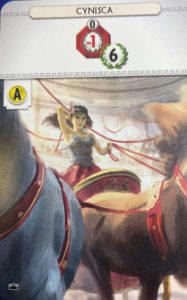 a military strategy. It also has a cost that goes up with each age. 1 gold in the first age, 2 in the 2nd and 3 in the 3rd.
a military strategy. It also has a cost that goes up with each age. 1 gold in the first age, 2 in the 2nd and 3 in the 3rd.
Enheduanna
The world’s first known author is widely considered to be Enheduanna, a woman who lived in the 23rd century BCE in ancient Mesopotamia.
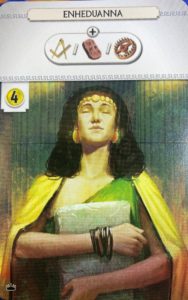 Game Use: At the end of the game, gaine 1 science symbol, whichever one you have the most of. In the event of a tie you may choose on of the tied symbols. The reason this is in the advanced section is you really have to have some other things fall in place for this card to be effective.
Game Use: At the end of the game, gaine 1 science symbol, whichever one you have the most of. In the event of a tie you may choose on of the tied symbols. The reason this is in the advanced section is you really have to have some other things fall in place for this card to be effective.
Eurypyle
An Amazon Queen
Game Use: At the end of the game, gain 5 victory points only if you have more military card in your city than each of your neighbors, counted separately. This card also has a variable cost based on the age it is played in. 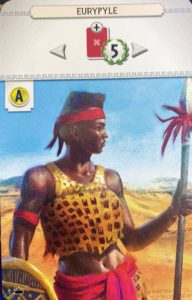 If you are already going for a military strategy, then this card would fit right in.
If you are already going for a military strategy, then this card would fit right in.
Gorgo
She is a figure of note for her wisdom, cleverness, and the apparent authority she assumed in the lives of those around her. Both her father and her husband listened to her counsel, and she is one of the few women mentioned by Herodotus in his Histories
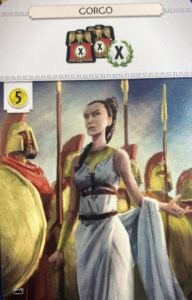 Game Use: You gain victory points for each pair of identical military victory tokens. For example in age three you win both of the military battles giving you two 3 point tokens. At the end of the game having this card in play will grant you 3 additional points. If you win all of your military battles you could get 9 additional victory points. With the scoring being at the end of the game you could play this card at the start of the 3rd age giving you the option to play a different card if you military strategy is blocked.
Game Use: You gain victory points for each pair of identical military victory tokens. For example in age three you win both of the military battles giving you two 3 point tokens. At the end of the game having this card in play will grant you 3 additional points. If you win all of your military battles you could get 9 additional victory points. With the scoring being at the end of the game you could play this card at the start of the 3rd age giving you the option to play a different card if you military strategy is blocked.
Hatshepsut
Pharaoh-Queen of the Eighteenth Dynasty. Economic prosperity is attributed to her rule as the trade networks of Egypt were considerably strong.
Game Use: Once she enters play, each purchase of one or more resources from a neighbor grant 1 coin from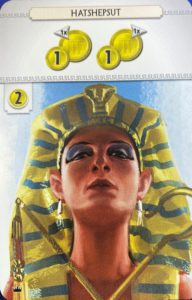 the bank. This gain is limited to one coin per neighbor per turn. This is gained after the purchase is complete and can’t be used to make the purchase. This can benefit a player looking to limit how many resource cards they plan to draft and could free up the focus to drafting other cards, relying on the resources of your neighbors.
the bank. This gain is limited to one coin per neighbor per turn. This is gained after the purchase is complete and can’t be used to make the purchase. This can benefit a player looking to limit how many resource cards they plan to draft and could free up the focus to drafting other cards, relying on the resources of your neighbors.
Makeda
The Queen of Sheba who she brings a caravan of valuable gifts for the Israelite King Solomon.
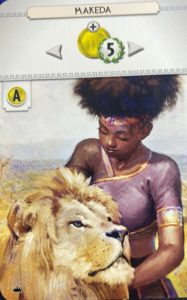 Game Use: At the end of the game, gain 5 victory points only if you have more Coins in your Treasure than each of your neighbors counted separetely. This pairs well with a couple of the wonders that naturally gain a lot of coin. Watch for cards that also gain you coins. One way is to have a lot of resources so your neighbors are buying from you and you don’t have to buy them yourself.
Game Use: At the end of the game, gain 5 victory points only if you have more Coins in your Treasure than each of your neighbors counted separetely. This pairs well with a couple of the wonders that naturally gain a lot of coin. Watch for cards that also gain you coins. One way is to have a lot of resources so your neighbors are buying from you and you don’t have to buy them yourself.
Nitocris
By some accounts she is said to have been the last pharaoh of ancient Egypt’s Sixth Dynasty.
Game Use: As soon as this card enters play, immediately gain a military Victory Token for the current Age. With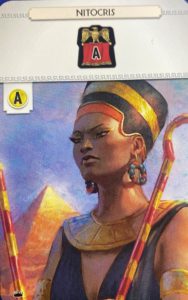 the variable cost this card can be tricky. If you bring it in at the start of the third age, you will pay three gold and get a 5 vp military victory token.
the variable cost this card can be tricky. If you bring it in at the start of the third age, you will pay three gold and get a 5 vp military victory token.
Phryne
This famous Greek courtesan was an artist and model. Because of her sallow complexion she was called by the Greek name for “toad.”
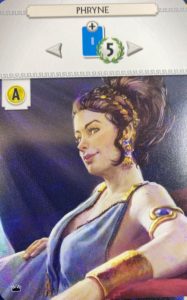 Game Use: At the end of the game, gain 5 victory points only if you have mroe blue cards in yoru city than each of your neighbors counted seperately. This can be tricky in that your neighbors are likely to be grabbing blue cards as well. It is easy for them to block you from this since they will catch on to your strategy once this card comes into play.
Game Use: At the end of the game, gain 5 victory points only if you have mroe blue cards in yoru city than each of your neighbors counted seperately. This can be tricky in that your neighbors are likely to be grabbing blue cards as well. It is easy for them to block you from this since they will catch on to your strategy once this card comes into play.
Telesilla
Telesilla was an ancient Greek poet, native of Argos. She was a distinguished woman who was especially renowned for her poetry and for her leadership of Argos through a political and military crisis and subsequent re-building.
Game Use: As soon as this symbol enters play, immediately discard all your Military Defeat tokens. All other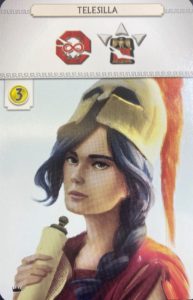 players discard 1 of their military victory tokesn (their choice). I often use this when I know I am not going to have a military stratagey. This takes away the sting of losing the military combats and lowers the advantage someone using a military strategy has.
players discard 1 of their military victory tokesn (their choice). I often use this when I know I am not going to have a military stratagey. This takes away the sting of losing the military combats and lowers the advantage someone using a military strategy has.
Theano
Theano of Crotone was a 6th-century BC Pythagorean philosopher.
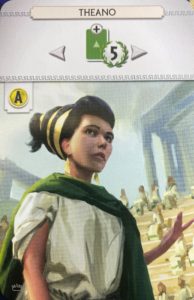 Game Use: At the end of the game, gain 5 victory points only if you have more cards of this color in your City than each of your neighbors, counted separately. Generally you would play this in the 3rd round to prevent others from trying to block you, hopefully by the time you reveal this you already have enough Green cards in play that it would be hard to block without hurting themselves.
Game Use: At the end of the game, gain 5 victory points only if you have more cards of this color in your City than each of your neighbors, counted separately. Generally you would play this in the 3rd round to prevent others from trying to block you, hopefully by the time you reveal this you already have enough Green cards in play that it would be hard to block without hurting themselves.
Tomyris
Legendary queen of the Massagete, who according to myth, cut off the head of the King of Persia, Cyrus the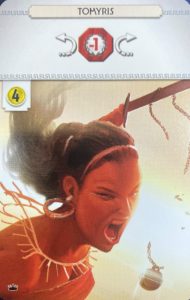 Great, to avenge her son.
Great, to avenge her son.
Game Use: Once Tomyris enters play, during conflict resolution, the Defeat tokens of this player are given to the victorious neighboring city. This is a great defense if you are not planning to invest in military.
Leaders if using both Leaders and Cities Expansion
Arsinoe
a Ptolemaic queen and co-regent of the Ptolemaic Kingdom of ancient Egypt. She was given the Egyptian title “King of Upper and Lower Egypt”, making her pharaoh as well.
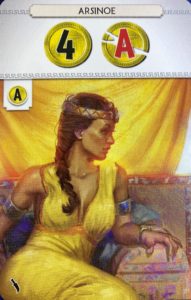 Game Use: As soon as this symbol enters play, immediately take 4 coins from the reserve. All other players lose as many coins as the current age. To get the biggest effect on other players you would play this at the start of age III.
Game Use: As soon as this symbol enters play, immediately take 4 coins from the reserve. All other players lose as many coins as the current age. To get the biggest effect on other players you would play this at the start of age III.
Aspasia
Aspasia was a metic woman in Classical Athens. Born in Miletus, she moved to Athens and began a relationship with the statesman Pericles, with whom she had a son, Pericles the Younger.
Game Use: Once this symbol enters play, take 1 diplomacy token form the reserve and place it on your wonder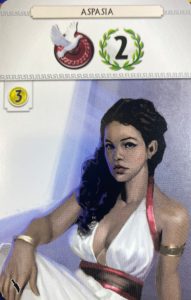 board. You also get 2 victory points at the end of the game.
board. You also get 2 victory points at the end of the game.
Caligula
Caligula, formally known as Gaius, was the third Roman emperor, ruling from 37 to 41
 Game use: Once this card enter play, once per age you can construct a black card for free. This does give you the biggest chance of benefit by getting this out as early as possible. It does also clue in your oponents that you will be seeking the black cards and they possibly will discard them to avoid you getting them.
Game use: Once this card enter play, once per age you can construct a black card for free. This does give you the biggest chance of benefit by getting this out as early as possible. It does also clue in your oponents that you will be seeking the black cards and they possibly will discard them to avoid you getting them.
Darius
Commonly known as Darius the Great, was a Persian ruler who served as the third King of Kings of the Achaemenid Empire, reigning from 522 BCE until his death in 486 BCE. He ruled the empire at its territorial peak, when it included much of Western Asia, parts of the Balkans (Thrace–Macedonia and Paeonia) and the Caucasus, most of the Black Sea’s coastal regions, Central Asia, the Indus Valley in the far east, and portions of North Africa and Northeast Africa including Egypt (Mudrâya), eastern Libya, and coastal Sudan.
Game Use: Grants 1 victory pint for each black card in your city. This is a great card to play in the 3rd era as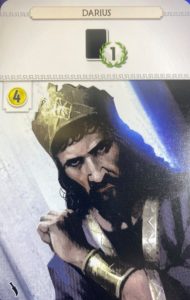 you will have a sense of if this card will have enough payoff compared to the other card you might have in your hand.
you will have a sense of if this card will have enough payoff compared to the other card you might have in your hand.
Diocletian
Diocletian was Roman emperor from 284 to 305. Born to a family of low status in Dalmatia, originally named Diocles, Diocletian rose through the ranks of the military to become a cavalry commander of the Emperor Carus’s army.
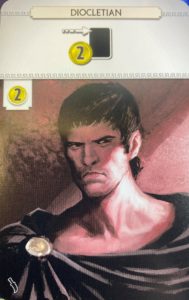 Game use: Once this card enters play, each time you construct a black card you mimmediately gain 2 coins form the reserve. This card is more valuable the earlier in the game you get into play.
Game use: Once this card enters play, each time you construct a black card you mimmediately gain 2 coins form the reserve. This card is more valuable the earlier in the game you get into play.
Octavia
Claudia Octavia was a Roman empress. She was the daughter of the Emperor Claudius and Valeria Messalina. After her mother’s death and father’s remarriage to her cousin Agrippina the Younger, she became the stepsister of the future Emperor Nero.
Game Use: after this card enters play, every time you build a stage of your wonder you gain 3 coins and all other players lose as many as coins as the age you are in. Like a lot of cards this is best to get into play early or at least before you start to build your wonders.